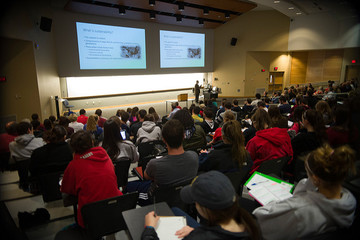
04/18/2017
Michael Bond ’75, M.D., is quick to credit independent undergraduate research as the key to his success.
“It gives you a confidence and a euphoria for learning,” said Bond, medical director of Advanced Dermatology and Cosmetic Surgery in Orlando, Fla.
Bond, who was inducted into the SUNY Cortland Academic Hall of Fame in 2016, said the research skills he learned at SUNY Cortland still motivate him today to learn, explore and innovate.
As the second SUNY Cortland alumnus to be directly accepted into medical school, Bond said his hands-on research opportunities set him apart from the field.
Bond will deliver the keynote address, “From There to Here,” at SUNY Cortland’s 21st annual celebration of student research, “Transformations: A Student Research and Creativity Conference” on Friday, April 28. He will reinforce the simple themes underlying each student’s research, be it biology, chemistry, kinesiology or any other field. The quest for answers is exhilarating for Bond, and he maintains his undergraduate passion to this day.
 |
| Michael J. Bond '75, M.D. |
“One of my slides is going to be about what undergraduate independent research does for you,” Bond said. “It takes you from reading the textbooks to reading the literature, which is so much more ahead of the textbooks. Beyond that, it teaches you that you are contributing to the literature and what it takes to write in the literature, medical or science literature.
“They appreciate what it takes to add to human knowledge and that you are really accomplishing something,” he continued. “What you do may have a huge impact on what somebody else discovers.”
Bond, a pediatric dermatologist, completed his education at SUNY Upstate Medical University and later the University of South Florida and the University of Tennessee Medical Center. He was trained by the Association of Clinical Research Professionals and has conducted extensive clinical research to collect biological samples for genetic study and to investigate topical treatments for childhood skin conditions. Bond has studied rare dermatological disorders, the malignant potential of giant congenital moles and their surgical removal and caring for children with catastrophic skin diseases. Bond’s findings have been published in Dermatology, Pediatrics and Psychology and he regularly presents at national dermatology events.
In addition to his work in dermatology, Bond is an accomplished scuba diver, a passion that developed after he took the first scuba diving course offered at SUNY Cortland. He is an avid underwater photographer, has had writing published in Marine Geology and National Geographic and helped to develop the first and most detailed map of the ocean floor.
As Bond was mapping the ocean floor by hand — this was before oceanographers had computerized assistance — he thought back to the work he had done at SUNY Cortland with David Berger, who is now professor emeritus of psychology after more than four decades of service on campus. No matter how arduous or impossible-seeming the task, Bond said the problem-solving skills he gained through undergraduate research prepared him for any challenge.
“I had all the confidence in the world because I had worked with Berger,” Bond said. “He took care of me to be able to think and ask the right questions and think what the questions should be, all that stuff that takes it from being just a great class I took. Entomology was a fantastic class and I’ll always remember it and there are a couple of lessons I learned there that were just phenomenal. But that was a class. The research was a life experience. I still live it.”
In 2015, Bond and former classmate Wayne Marley, M.D., class of 1975, made a major gift to the College to establish the David F. Berger Summer Research Fellowship, an award for SUNY Cortland’s top undergraduate student pursuing independent research in biology, chemistry or psychology.
Bond is glad to help extend research at SUNY Cortland. His time on campus made him who he is today and he hopes the current generation of students find similar fulfillment in their research.
“It’s their responsibility to take advantage of all the opportunities that are available,” Bond said. “It’s the responsibility of my era to make sure there are as many opportunities as possible for them to take advantage of. We can’t do the work, but we can work hard to get them what they need to do it. I am euphoric about all this. All I see is the tremendous upside that this thing can have through the years as we rotate speakers and change the subjects and get in more and more.”
Dozens of undergraduate and graduate students will present their research at Transformations through presentations and poster sessions on April 28 from 12:30-5:30 p.m. in Old Main. Bond’s keynote address begins at 12:30 p.m. in Old Main Brown Auditorium.
For more information, contact the School of Arts and Sciences Dean’s Office at 607-753-4312.